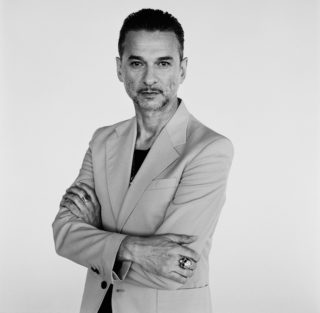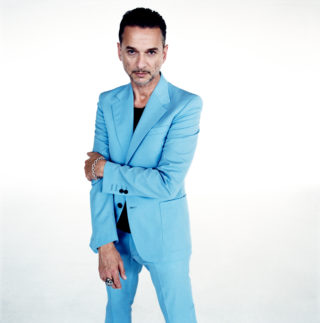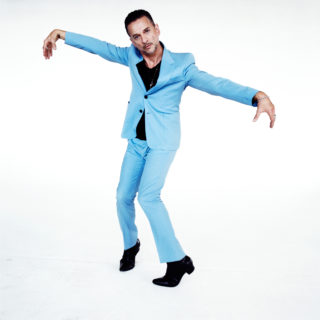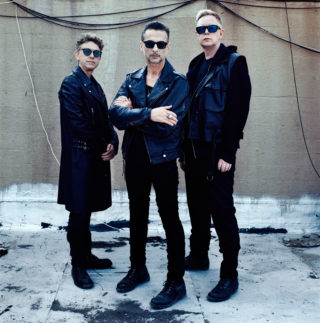Tell Me About It: Dave Gahan – “‘Why is your music so depressing?’ is a really lame question”
The Depeche Mode singer on crappy gigs, addiction and escaping death... twice

The Depeche Mode singer on crappy gigs, addiction and escaping death... twice
Dave Gahan is stationed in the basement of the swanky Bulgari Hotel in Knightsbridge. As I wait outside his room in music journalist purgatory, waiting for an interview with some other mag to round up, I’m told that it shouldn’t be long but, well, unfortunately, Dave is enjoying the conversation so much that he wants to keep chatting. Maybe we’ll get on really well too, I think.
When I am finally beckoned in, Gahan welcomes me to the conference room that’s become his office for the day. He is warm, full of smiles, and even offers me a smoothie. Radioactive green, it’s a sign of the journey from Gahan’s dark days in the late ’80s and, well, most of the ’90s. It’s fair to say that the rider requests for a man who’s come through heroin addiction and bladder cancer is a little different these days. With hair slicked back, pencil moustache neatly groomed and a silver skull ring nestling on his middle knuckle, it’s hard to equate him with the 19-year-old Epping boy in the oversized suit who nervously bopped his way through ‘Just Can’t Get Enough’.
Of course, a lot of well-documented water has passed under the bridge since Gahan and Depeche Mode arrived with the synthpop agenda-setter ‘Speak & Spell’ in 1981. Fourteen studio albums is a pretty solid achievement in itself, but when you hear the context of the hurdles that had to be negotiated in order to do so, it pulls the feat into sharper focus. Through ailing health, substance abuse and a couple of run-ins with the law, Depeche Mode have somehow stayed united. Depsite the chaotic highs and creativity-sapping lows, the release of their latest LP, ‘Spirit,’ continues a run of at least one album every four years for the last 35. Impossibly, Depeche Mode have become one of British music’s most reliable forces.
As Gahan speaks in staccato – all full-stops and short and rapid-fire sentences – he flits from topic to topic and I may as well have left my nice, crisp A4 sheet of questions at home, because I barely say anything. Jumping from the band’s recent gig at Glasgow’s Barrowlands to the merits of theatre and the ethic behind Depeche Mode’s ‘depressing’ sound in the first five breakneck minutes, at 54 Gahan is full of energy. But while it can be hard to keep track, Gahan’s passion is the thread that ties our conversation together.


There’s not many of them left like that. We just played there for BBC 6 Music festival, but we first played there in the early ’80s – someone told me it was 1984. I remember at the time it was pretty heaving. The stage moves a bit because the floor moves a bit. So once it gets going…
It was fun to do that show last week, which was maybe an hour long – much shorter than the two-hour show that we usually do. I got a couple of texts from Bobby Gillespie that said: “perfect time.” For performing, an hour is the perfect time.
We had a beautiful few days in Glasgow. To be in England or Scotland or Ireland and it to be good weather, you actually get to see how beautiful it is, really. And I love the people up there. People in the hotel and on the street – everywhere. Good people!
I recently saw the play Buried Child by Sam Shepard. I love all Sam Shepard’s stuff. They’re usually based in the American heartland and what it’s really like – not the American Dream. Buried Child is about a child who wasn’t wanted and ended up being buried in the garden and haunts the family, spiritually. So everything they do for their drunken lives is haunted by that. Some people would say that it’s a miserable story, but stories like that, to me, are real life.
It’s like, the question I’ve had to answer many, many times, is where people are like, ‘Why is your music so doomy?’ First of all, it’s a really lame question, but the answer is always the same – ‘Well, I don’t find it like that.’ I just never have. I don’t. I get that some of the subject matter is quite dark, and musically it can be quite dark, but I’ve always felt that if the lyric was really black and if we were going into some weird, dark place, there’s a melody or a sound or something there that lifts you out of that. Like in a good book, or a film – there’s a story there.
I tend to dwell there quite a lot. And it’s OK because I find that it’s the only place you can find any real light anyway. You’ve got to dig deep because all the surface bullshit – all this stuff [he lifts up his iPhone and shakes it] – is where we seem to waste our time.
Of course we care. The thing about reviews is that someone told me a long time ago that if you believe the good ones you’ve got to believe the bad. There’s always a bit in both and it’s all opinions.
What I liked about one review I read of the Barrowlands show was that the person was actually reviewing the sentiment in the feeling in the moment, and how they felt. And that was undeniable! If he had said anything else about that night – that he didn’t like my trousers or something – it would have been ridiculous because it was a special night. But they’re not all like that – trust me!
Sometimes someone will give me a newspaper in the morning and we’re off to the next gig, and I know it’s been a shit show the night before, or that it wasn’t quite right. The moment wasn’t really there, and someone’s seen through it. And you read it and you’re still like, ‘Fuck you!’ But they can’t all be gems. Over the years you learn that [once in a while] you have this special feeling and you look around at each other and you’re all floating on air, but most of the time you’re getting through a song and you’re thinking about something else. Well, not most of the time. But quite often towards the end of the show I’ll be thinking about whether there’s room service.

There was one time when we made the decision not to tour and that was with the album ‘Ultra’ [1997] because I definitely was not healthy enough to tour. I was trying to convince everybody that I was, and I had all good intentions but, put it this way, six months into the recording of the album, after a big session we did in New York, I went back to L.A. and then stuff happened and I ended up in jail [Gahan was arrested after overdosing on a speedball at the Sunset Marquis Hotel in 1996]. So it really was a good decision.
After that album I think we put out a greatest hits – 1998, I’m thinking. And we did some shows. For me, that was the best and the worst tour we’ve ever done because I don’t think I was in any of those performances. It was all new for me. I was no longer drinking any alcohol or using any drugs and I was like an open wound; a bag of nerves trying to fake it ‘til I made it. I had no business being on the road and I had a few moments in dressing rooms. I remember launching six or seven bottles of wine at the wall because I couldn’t drink it. That was my share and if I wasn’t going to be able to drink it then it was going to go against the wall. While the band were all in the dressing room as well. It must’ve been quite scary, thinking about it. I was not happy at this idea of being sober and that I would have to do this for the rest of my life if I wanted to keep on living. And that’s nearly 20 years ago, which is incredible in itself, although it’s not been without its bumps and bruises along the way. It’s been a real mind opener – much more than any drugs or alcohol.
I remember being back at my home in L.A. after being arrested. I got a phone call – and I never picked up the phone – and it was Martin [Gore], kinda angry and kinda pissed off that we were in the middle of recording an album and I was not going to be able to leave Los Angeles for two years. If I got into trouble, I was going to jail. So they carried on working on stuff and then created sessions for when I was allowed out of this place I was in, which I’d checked myself into. I ended up staying there for six months – I was terrified of going back home because I knew what I was going to do. I made some good friends there and I went to the studio with someone who was watching over my shoulder, but it saved my life.
I couldn’t sing at that point. I mean physically, I couldn’t sing for longer than five minutes. And it was not good. There were times when I thought I was good during the first half of the making of that album, but I was probably high. I thought I was Frank Sinatra when I was up at the mic, but listening back it was like, ‘Jesus!’. So they made me work with this amazing vocal coach, Evelyn. She would only work with me – because I was a real scumbag at the time – if I would go to this church with her in downtown L.A. in a pretty rough neighbourhood in Inglewood, somewhere where she would do this thing every Sunday working with the choir. She said: ‘You come with me and sing with the whole group; you’ve gotta be part of a team!’ She was so nice and gentle with me and gave me a lot of her time. She kinda brought my voice back to me. And that album got finished.
During the making of ‘Sounds of the Universe’ [2009] I’d not been feeling good. I had no energy a lot of the time. I would have enough energy to do the sessions in the studio and I’d get home at night and say to the wife that I was so tired. I was kind of crashing out at 9 in the evening, and I wasn’t really telling the guys. But then it all made sense when I was diagnosed.
I used to say to, Jen, my wife, ‘I don’t know if I’m going to be able to do these shows.’ So then we were in Athens and I was having excruciating pain in my gut. Well, it felt like my gut but it wasn’t. So that night the doctor came to the dressing room, five minutes before we were due on stage. I’d been throwing up a bit – I hadn’t been talking about that. Little bit of blood in my urine – I hadn’t been talking about that. I just thought all these things were wear and tear.
But I got rushed to hospital and while the doctor was doing an ultrasound he looked at me and looked at the screen again. I said: ‘I know I’m not pregnant!’ and he said ‘Well, I see something and I have to get someone else in.’ So I said: ‘What do you see?’ and he said: ‘I see a shadow.’ I’ve heard that in movies. It just so happened that there was an oncologist there and I got on the MRI and they said that they could do the surgery there and then. You have a sac in your bladder and you have another sac on the inner sac, and the cancer hadn’t got through the walls yet. It’s an amazing looking thing! My wife was like: ‘What are you looking at pictures of your tumour for?’ But it looked like a sea urchin with all these alien tentacles! It’s an amazing thing. But if they go undiagnosed and it goes into other organs you’re done, really.
‘Spirit’ is more of a social outlook on humanity itself, and we’re lost. We seem to be pretending we’re not, but we’re fucking lost! It’s a bit apocalyptic and bit post-apocalyptic in places, this record; ‘Cover Me’ being post-apocalyptic, ‘Fail’ being now, ‘Poison Heart’ being, you know – ‘You’re the devil and we all know it, but you’re in power!’ And then there are songs like ‘Going Backwards’ or ‘Scum’, which are just horrified at humanity, at ourselves.
Where’s the spirit? Where’s the spirit in really caring? And people say, you know, ‘It’s easy for you guys in your fancy houses,’ but like Martin has said, just because you’ve had some success it doesn’t mean you have to stop caring about what you see and feel. And you do the best you can. The way we can portray how we feel is through music, through art. And ultimately we’re here to entertain you but to maybe entertain you with a sense of reflecting. This is not a record that’s ramming something down your throat. This is not Billy Bragg.